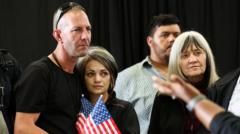A group of 59 white South Africans has arrived in the US to receive refugee status, with the Trump administration justifying the swift processing by citing persecution based on race. However, the South African government and various critics dispute the necessity of such actions, highlighting the complex dynamics of land reform and racial issues in South Africa.
White South Africans Granted Refugee Status in the US Amid Controversy

White South Africans Granted Refugee Status in the US Amid Controversy
59 Afrikaners arrive in the US under expedited refugee applications, drawing criticism for perceived racial bias.
A group of 59 white South Africans landed at Dulles Airport, Washington DC, after being granted refugee status by the US government under a controversial plan introduced by former President Trump. This initiative reportedly aimed to assist the Afrikaner minority, whom Trump claims are victims of racial discrimination and violence in South Africa.
The situation has sparked backlash both domestically and internationally, with the South African government firmly denying any claims of persecution that would justify refugee status for this group. South African President Cyril Ramaphosa maintained that the country was not experiencing any "genocide" against white farmers, contradicting Trump's assertions. Ramaphosa emphasized that a refugee must leave their home due to genuine political, religious, or economic persecution.
In contrast to general refugee admissions, which have been severely restricted under the Trump administration, the arrival of these Afrikaners was notably fast-tracked. The United Nations Refugee Agency (UNHCR) confirmed they were not involved in the vetting process for this group, raising further questions about the rationale behind their expedited entry.
Critics, including Human Rights Watch, have labeled the decision as a disturbing racial twist to US immigration policy, pointing out that many other refugees from more pressing crises have been unjustly denied entry. The Episcopal Church also announced it would halt collaboration with the government on refugee matters over preferential treatment toward Afrikaners.
Elon Musk, an adviser to Trump and a South African native, has echoed the sentiment of a "white genocide," which many observers have deemed unfounded. The reality on the ground reflects a different picture: recent statistics indicate that violent crime and farm murders are not exclusively targeting white farmers, further complicating the narrative of widespread victimhood based on race.
As the US continues to navigate its immigration policies, the arrival of the white South African refugees demonstrates the intricacies of racial politics, both in South Africa and America, while revealing the ongoing tensions tied to historical injustices and land ownership issues.






















